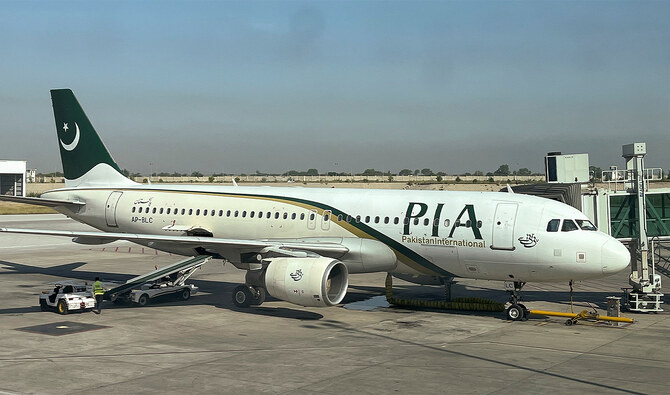ISLAMABAD: Pakistan’s Privatization Commission Board on Friday announced the auction of the country’s national air carrier on October 1 in an official statement released after holding a meeting to evaluate the ongoing sales process.
The government has been seeking to sell Pakistan International Airlines (PIA), which has been burdened with debt amounting to Rs800 billion ($2.9 billion), after approving several bailout packages at the request of its management to cover operational expenses in the past.
The country initially wanted to finalize the airline’s privatization deal on its Independence Day, August 14, but the process was delayed following requests from bidders awaiting PIA’s latest audited accounts, aircraft lease agreements and clarity on flights to Europe, which have remained suspended for nearly four years.
“The bidding for PIA’s privatization is scheduled to take place on October 1, 2024,” the statement said.
It informed the board meeting considered the recommendations of its financial adviser to amend the document containing the criteria related to potential bidders to ensure a smoother sales process.
“The board reviewed the current status of PIA’s privatization and considered the financial adviser’s recommendations regarding permissible changes under the Request for Statement of Qualification (RSOQ) terms,” it said.
The Privatization Commission has pre-qualified six bidders, which include Fly Jinnah, a consortium led by YB Holdings (Private) Limited, Air Blue Limited, a consortium led by Pak Ethanol (Private) Limited, Arif Habib Corporation Limited and Blue World City.
The process is also significant since it has been recommended by the International Monetary Fund (IMF) that wants the country to privatize all lossmaking state-owned entities as part of the rationalization of national economy.
Pakistani officials have already taken up the issue of PIA flight restoration to Europe, with Deputy Prime Minister Ishaq Dar describing it as a “major priority” for the government during a five-day visit to London earlier this month.
The suspension of PIA flights followed a 2020 plane crash in Karachi that killed 97 people.
The incident was followed by a controversial statement by a former aviation minister, Ghulam Sarwar Khan, who said that a significant number of Pakistani pilots held fake licenses.
This led the European Union Aviation Safety Agency to impose a ban on PIA.














